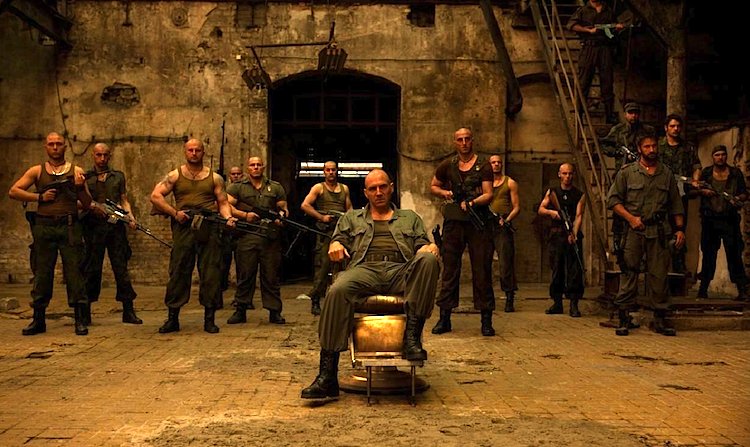 By Joe Bendel. It has long been considered one of Shakespeare’s most divisive tragedies. Though academic appraisals remain quite mixed, Coriolanus always had its champions, including poet T.S. Eliot. As a result, there are few cinematic predecessors against which actor Ralph Fiennes directorial debut might be compared. In the Olivier-Branagh tradition, Fiennes also stars in his contemporary retelling of Coriolanus (trailer here), which begins a one week Oscar qualifying engagement in New York this Friday.
By Joe Bendel. It has long been considered one of Shakespeare’s most divisive tragedies. Though academic appraisals remain quite mixed, Coriolanus always had its champions, including poet T.S. Eliot. As a result, there are few cinematic predecessors against which actor Ralph Fiennes directorial debut might be compared. In the Olivier-Branagh tradition, Fiennes also stars in his contemporary retelling of Coriolanus (trailer here), which begins a one week Oscar qualifying engagement in New York this Friday.
In a Balkan city that “calls itself Rome,” Caius Martius has earned the honorific title “Coriolanus” for his victory over the city-state’s bitter rival, the Volsces. At the behest of his proud mother Volumnia and her ally Senator Menenius, the general consents to campaign for the office of Consul. The approval of the Senate is assured, but Coriolanus’s candidacy must also be accepted by the masses. This is a taller order, especially given the officer’s refusal to pander to the lowest common denominator.
Nonetheless, with Menenius’s help, Coriolanus appears to win over the people. Yet just as quickly, the deceitful senators Brutus and Sicinius turn the crowd against him, with the help of a cadre of professional activists. Venting his outrage, Corilanus’s contempt for the fickle masses leads to his banishment. It also drives him to Volsces, where he makes common cause with his old nemesis, Tullus Aufidius. Dead to everything except his rage, Coriolanus will have his revenge in a manner befitting Shakespearean tragedy.
Given his abruptly shifting loyalties and his un-Shakespearean lack of introspection, Coriolanus is a difficult figure for many to get their heads around. However, Fiennes’ portrayal really unlocks his character. We can understand how his rigid conception of honor compels each action he takes. Despite Corilanus’s reticence, it is a big, seething performance of great physicality that commands viewer attention. Clearly this is a man of action, not given to soliloquizing.
This is definitely Shakespeare at his manliest (no tights or sonnets here, thank you very much). Indeed, Gerard Butler matches Fiennes’ testosterone as Aufidius, while Vanessa Redgrave nearly outdoes them both as Volumnia, the motherly Lady Macbeth. Yet the real soul of the film comes from the great Brian Cox as Menenius, whose humanity leads inexorably to pathos. Though a relatively small part, it is also interesting to see South African actor John Kani, who projects a suitably stately presence as Coriolanus’s former superior officer, General Cominius.

Though Fiennes’ effectively streamlined the film adaptation, it is also obvious why the original play troubles so many critics, given its scathing depiction of the Roman masses as no more than a weapon to be wielded by the unscrupulous. Frankly, in Coriolanus, “the people” get what they deserve. Indeed, the film comes at a time when it rather inconveniently begs comparison to uninformed masses occupying Zucotti Park.
An impressive directorial debut, Fiennes stages some vivid scenes of warfighting. His resetting of the story works more often than not, though the cable news flashes in Shakespearean English can be a bit jarring. Strikingly cinematic, the Belgrade locales also add the weight of contemporary historical tragedy, heightening the on-screen drama. One of the better recent Shakespearean films (considerably more satisfying than Taymor’s Tempest, for example), the unexpectedly timely Coriolanus is definitely worth seeing. It begins a special one week New York run for Academy Award consideration today (Friday, 12/2) and then opens more widely on January 20th.
Posted on December 2nd, 2011 at 10:56am.